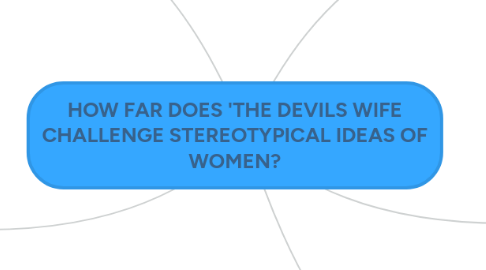
1. POWER SHIFTS
1.1. Beginning sees male dominance
1.1.1. "Looked at the girls in the office as though they were dirt"
1.2. Attraction can be seen despite this
1.2.1. "I'd stare him out, chewing gum. Insolent. Dumb"
1.2.1.1. Immature, simple
1.2.1.2. Not empowering, submissive to him, longing for attention/affection
1.3. Anti-romantic
1.3.1. "He bit my breast." / "He entered me." / "I went mad for the sex"
1.3.1.1. Lacks stereotypical passion because of the blunt sentence structures. "The sex" makes it completely impersonal. Lacks romance
1.4. She gains power
1.4.1. "I'd walk around on my own. He tailed" / "Nobodys Mam"
1.4.1.1. The literal image of him behind her connotes a powershift. She reminds herself she's a grown woman. Takes away her maternal instincts, short sentence sounds forceful which suggests brute-like, evil
1.5. Acceptance of the crime
1.5.1. "I know it was me who was there. I know I carried the spade. I know I was covered in mud." / "I said No not me I didn't I couldn't I wouldn't"
1.5.1.1. Refrain emphasises her acceptance. She understands and admits without any guilt. But goes on to become desperate through end stop lines, creating a faster and more frantic pace seeming as though she's lost her mind
2. LACK OF MATERNAL INSTINCT
2.1. Complete denial
2.1.1. "Can't remember no idea it was him it was him."
2.1.1.1. Shuts out reality, refuses to admit to actions which she has previously admitted too. Invents another personal reality.
2.2. Reference to victims
2.2.1. "he made me bury a doll"
2.2.1.1. Metaphor for victims, admitting her actions. Doll connotes she didn't fully understand what she was doing, and so creates a different reality.
2.3. Contextual
2.3.1. "These are the words that crawl out of the wall: Suffer. Monster. Burn in Hell."
2.3.1.1. Viewed by many as most evil woman in Britain because of her actions. Quote reflects her acknowledgement of this.
3. WOMENS INDEPENDENCE
3.1. Dependent on others for survival
3.1.1. "Send me a TV crew send me a journalist."
3.1.1.1. Subverts female independence, as she was dependent on her man before prison and is now dependent on maintaining contact with the outside world.
3.2. Religious exploration
3.2.1. "I said Send me a lawyer a vicar a priest"
3.2.1.1. She has become religious. This stanza is appealing directly to the reader, making them uncomfortable. Lawyer becomes equal to priest, suggesting extreme desperation.
3.2.2. "When I was the Devil's wife"
3.2.2.1. Acceptance that she is controlled and owned by the devil, this point she understands her actions
3.2.3. "Dying inside." / "I was left to rot" / 'When morning comes I will finally tell."
3.2.3.1. Constant reference to death throughout poem shows lack of hope, blunt acceptance of fate.
3.3. Childlike mentalility
3.3.1. "Can't remember no idea not in the room. No idea can't remember not in the room"
3.3.1.1. Complete denial from previous stanzas, shutting out reality by inventing her own
3.3.2. "If I'd been stoned to death If I'd been hung by the neck"
3.3.2.1. Repetitive, childlike tone which contrasts with the sadistic suggestions of death
3.4. Reference to women united
3.4.1. "But what did I do to us all, to myself When I was the Devil's wife?"
3.4.1.1. "us" suggests women all together, her final acceptance for self/actions creates the idea that she has repented. The use of a past participial suggests she's moved on from being her mans possession.
4. VIOLENT OR EVIL NATURE
4.1. Most women in literature are portrayed as sensitive, emotional and dependent
4.1.1. "a shrink where's my MP send him to me."
4.1.1.1. Her use of imperatives make her seem demanding, controlling and self centred.
4.1.2. "If from ear to ear my throat If a bullet a hammer a knife"
4.1.2.1. The repetition in this stanza could show mental instability. Also, a final plea for forgiveness.
4.1.3. "I howled in my cell"
4.1.3.1. First use of emotive language in the 2nd part. This verb is very raw and animalistic, creating a image of entrapment.
5. SELF CRITIQUE
5.1. Shares common insecurity about appearence
5.1.1. "Nobody liked my hair, nobody liked how I spoke"
5.1.1.1. Shows that she wanted to be perceived in a specific light and knew what people were saying
5.1.2. "I gave the cameras my Medusa stare"
5.1.2.1. Reference to the mythological Medusa who turned people to stone with a glance and typically known for her ugliness. Suggests that she is misunderstood and no one can approach her. Or, that she has little self confidence, mirroring that of many females.
5.1.3. "I felt like this: Tongue of stone. Two black slates for eyes."
5.1.3.1. She dehumanises herself, with reference to death. Given up life for her man, left feeling fragmented and not confident.
